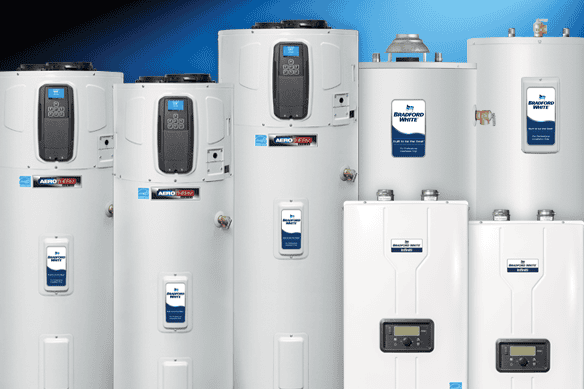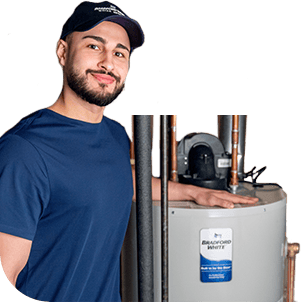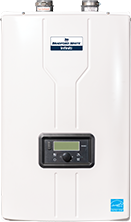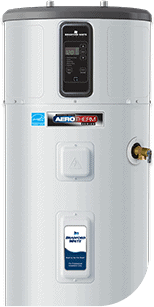Tankless vs. HPWH vs. Tank – Which is right?

Not long ago, choosing a water heater was a pretty straightforward decision. You probably replaced the tank with a similar model – a conventional gas or electric tank-type water heater.
Today, you can still choose a conventional gas or electric tank model but, with new technology, you can also consider a tankless or a heat pump water heater. The question is, which one is the best choice for you?
At Bradford White, we want to give you the information you need to talk to your plumbing professional and make the best, educated decision. So we’ve put together this comprehensive guide that compares conventional tank water heaters with tankless and heat pump water heaters. Read on to help you decide which is the best fit for your home, lifestyle and budget.
1. The Conventional Storage Tank Water Heater
When someone says “water heater,” you probably picture the conventional tank-type water heater. It has been the standard water heater for decades and does a great job delivering hot water.
- How It Works: A large, insulated tank stores hot water so it’s ready when you need it. The tank is usually 40 or 50 gallons for a typical home unless you have a big family and have upgraded to a larger tank. The water is heated by a gas burner (natural gas or propane) or with electric heating elements and is kept at a constant temperature, ready for use whenever you turn on hot water at a faucet or get into the shower.
- Pros:
- Lower Upfront Cost: Traditional tank heaters generally have the lowest initial purchase and installation cost.
- Proven Reliability: Tank water heaters are a proven technology with a long track record of performance. Bradford White tank water heaters are known for their long lifespans and will give you many years of trouble-free performance.
- Simple Installation: Installation is typically straightforward, especially when replacing an existing tank model. This helps keep your installation costs lower.
- Cons:
- Standby Heat Loss: Tank water heaters can experience “standby heat loss.” The heater constantly works to keep the stored water hot, which consumes energy. Newer tank water heaters are highly insulated to reduce heat loss, but some standby heat loss is inevitable.
- Limited Hot Water Supply: When all the hot water is used from the tank, you are temporarily out of hot water. You may have experienced this if you were the last person in your family to take a shower. The rate at which the tank replenishes its hot water supply is called its recovery rate and is measured in GPH (gallons per hour). The recovery rate is affected by the size of the tank, the input, the fuel source, and what temperature setting you are using. Modern tanks typically have a fast recovery rate, but you will still need to wait a short time once all the hot water in the tank has been used.
- It’s Right For You If: You are looking for lower purchase and installation costs, and want a simple and reliable replacement of an existing tank water heater. Check out Bradford White’s full line of residential water heaters now.
2. The Tankless Water Heater
Tankless water heaters have revolutionized hot water delivery by eliminating the storage tank entirely.
- How It Works: These units heat water “on-demand”, only when you need it. When you turn on a hot water faucet anywhere in your home, a powerful heat exchanger instantly heats the water as it flows through the unit. It will continue running and heating the water as long as you need it.
- Pros:
- Endless Hot Water: If properly sized, you’ll have essentially an unlimited supply of hot water. Because there is no tank to run through, you can take long, hot showers with no fear of ever running out of hot water.
- Increased Energy Efficiency: Because you don’t have to constantly heat a large tank of water, there is no standby heat loss. This can lead to significant energy savings, often up to 30-40% compared to a traditional tank.
- Compact Size: Because there’s no tank, you save space wherever your water heater is located. Tankless water heaters are usually mounted on a wall which saves valuable floor space.
- Long Lifespan: With proper maintenance, tankless water heaters can last over 20 years.
- Cons:
- Higher Upfront Cost: Tankless heaters have a higher initial purchase and installation cost. You may need to run a gas line or electrical service to the unit which may increase the installation cost.
- Flow Rate Limitations: Tankless water heaters can only heat a certain volume of water at a time. If multiple appliances are drawing hot water simultaneously, you might experience a drop in temperature. It’s important that you size the tankless water heater correctly for your needs.
- It’s Right For You If: You or your family have a high demand for hot water and you don’t want to worry about running out of hot water ever again, if you’re focused on long-term energy savings or if you want to save space in your basement or utility room. Learn more about Bradford White’s Infiniti® Series of Tankless Water heaters.
3. The Heat Pump Water Heater
Heat pump water heaters are the newest and most energy-efficient water-heating technology available today. They use innovative heat pump technology to heat water and store it in a large tank.
- How It Works: A heat pump water heater uses innovative heat pump technology to heat water more efficiently than conventional electric water heaters. The heat pump works like a refrigerator in reverse. It draws heat from the surrounding air and transfers that heat to the water in the tank.
- Pros:
- Unmatched Energy Efficiency: Heat pump water heaters can be up to 3-4 times more energy-efficient than a conventional electric water heater. This can dramatically reduce your energy bills and save you money for years to come.
- Eligibility for Rebates: Due to their high efficiency, heat pump water heaters often qualify for generous utility rebates and federal tax credits, which can significantly offset their initial cost. Check for rebates in your area.
- Cons:
- Higher Upfront Cost: Heat pump water heaters are more expensive than other options, though rebates can help. However, the water heater essentially “pays for itself” in energy savings over time.
- Installation Requirements: Heat pump water heaters require a certain amount of space and clearance to draw in air, and they work best in spaces that remain above 40°F (such as a garage or basement).
- It’s Right For You If: You want the most energy-efficient, environmentally-conscious hot water option available, you want to lower your energy bills and save money every month or if you want to take advantage of available rebates. Learn more about the AeroTherm® Series Heat Pump Water Heaters from Bradford White.
Finding the Right Bradford White Water Heater for You
Whether you’re leaning toward the proven performance and simplicity of a traditional tank water heater, the endless hot water supply of a tankless water heater, or the unparalleled efficiency of a heat pump water heater, Bradford White offers a wide range of models in each category. Every Bradford White water heater is Built to be the Best® for outstanding quality, performance, and reliability for years to come.
To help you make the final decision, we recommend consulting with a qualified plumbing professional in your area. They can look at your needs, hot water usage patterns, and budget to recommend the perfect Bradford White water heater for you. Don’t have a plumbing professional? Click here to find a Bradford White plumbing professional in your area.



